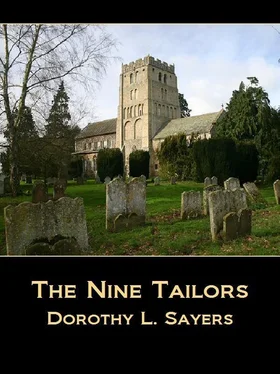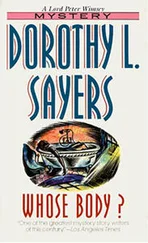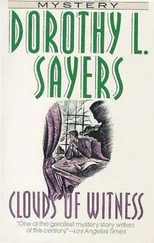Dorothy Sayers - The Nine Tailors
Здесь есть возможность читать онлайн «Dorothy Sayers - The Nine Tailors» весь текст электронной книги совершенно бесплатно (целиком полную версию без сокращений). В некоторых случаях можно слушать аудио, скачать через торрент в формате fb2 и присутствует краткое содержание. Жанр: Классический детектив, на английском языке. Описание произведения, (предисловие) а так же отзывы посетителей доступны на портале библиотеки ЛибКат.
- Название:The Nine Tailors
- Автор:
- Жанр:
- Год:неизвестен
- ISBN:нет данных
- Рейтинг книги:3 / 5. Голосов: 1
-
Избранное:Добавить в избранное
- Отзывы:
-
Ваша оценка:
- 60
- 1
- 2
- 3
- 4
- 5
The Nine Tailors: краткое содержание, описание и аннотация
Предлагаем к чтению аннотацию, описание, краткое содержание или предисловие (зависит от того, что написал сам автор книги «The Nine Tailors»). Если вы не нашли необходимую информацию о книге — напишите в комментариях, мы постараемся отыскать её.
The Nine Tailors — читать онлайн бесплатно полную книгу (весь текст) целиком
Ниже представлен текст книги, разбитый по страницам. Система сохранения места последней прочитанной страницы, позволяет с удобством читать онлайн бесплатно книгу «The Nine Tailors», без необходимости каждый раз заново искать на чём Вы остановились. Поставьте закладку, и сможете в любой момент перейти на страницу, на которой закончили чтение.
Интервал:
Закладка:
“I do not know. On opening the abdomen I found the stomach, intestine, liver and spleen considerably decomposed, the kidneys, pancreas and oesophagus in a fairly good state of preservation.” (Here the doctor wandered off into medical detail.) “I could not see,” he resumed, “any superficial signs of disease or injury by poison. I, however, removed certain organs” (he enumerated them) “and placed them in sealed jars” (further technical details) “and propose dispatching them to-day for expert examination by Sir James Lubbock. I should expect to receive his report in about a fortnight’s time — possibly earlier.”
The coroner expressed himself satisfied with this suggestion, and then went on: “You mentioned injuries to the arms and ankles, Doctor; what was the nature of those?”
“The skin of the ankles seemed to have been very much broken and abraded — as though the ankles had been tightly bound with cord or rope which had cut through the socks. The arms also showed the pressure marks of a rope above the elbows. These injuries were undoubtedly inflicted before death.”
“You suggest that somebody tied the deceased up with ropes, and then, by some means or other, brought about his death?”
“I think that the deceased was undoubtedly tied up — either by another person or by himself. You may remember that there was a case in which a young man at one of the universities died in circumstances which suggested that he had himself bound his own wrists and arms.”
“In that case, the cause of death was suffocation, I believe?”
“I believe it was. I do not think that was the case here. l round nothing to indicate it.”
“You do not, I suppose, suggest that the deceased went so far as to bury himself?”
“No; I do not suggest that.”
“I am glad to hear it,” said the coroner, sarcastically. “Can you suggest any reason why, if a man had accidentally or intentionally killed himself by tying himself up—?”
“After tying himself up; the tying of the arms and ankles would not in themselves be likely to cause death.”
“After tying himself up — why somebody else should then come along, smash his face in and then bury him secretly?”
“I could suggest a variety of reasons; but I do not think that is my province.”
“You are very correct. Doctor.”
Dr. Baines bowed. “He might, I suppose, have perished of starvation, if he had tied himself up and been unable to free himself?”
“No doubt. Sir James Lubbock’s report will tell us that.”
“Have you anything further to tell us?”
“Only that, as a possible aid to identification, I have made as careful a note as I can — in view of the extensive mutilation of the jaws — of the number and condition of deceased’s teeth, and of the dental work done upon them at various times. I have handed this note over to Superintendent Blundell in order that he may issue an inquiry.”
“Thank you, Doctor; that will no doubt be very helpful.”
The coroner paused, glanced through his notes and then turned to the Superintendent.
“In the circumstances. Superintendent, it seems to me advisable to adjourn the inquest until you have completed your investigations. Shall we say, till to-day fortnight? Then, if you should see your way to making any charge against anybody in connection with this crime, or accident, or whatever it is, we may if you like adjourn the inquiry sine die.”
“I think that would be the best way, Mr. Compline.”
“Very well. Gentlemen, we will adjourn until today fortnight.”
The jury, a little puzzled and disappointed at not being asked for any opinion, filed slowly out from behind the long trestle table at which they had been seated — a table dedicated under happier circumstances, chiefly to parish teas.
“A beautiful case,” said Lord Peter, enthusiastically, to Mr. Venables. “Quite charming. I am uncommonly grateful to you for drawing my attention to it. I wouldn’t have missed it for the world. I like your doctor.”
“We consider him a very able man.”
“You must introduce me to him; I feel that we should get on well together. The coroner doesn’t like him. Some trifling personal antagonism, no doubt. Why, here is my old friend Hezekiah! How do you do, Mr. Lavender? How’s Tailor Paul?”
There was general greeting. The Rector caught the arm of a tall, thin man hurrying past their little group.
“Just a moment. Will. I want to introduce you to Lord Peter Wimsey. Lord Peter, this is Will Thoday, whose bell you rang on your last visit.”
Hands were shaken. “Very sorry I was to miss that peal,” said Thoday. “But I was pretty bad, wasn’t I, Rector?”
“You were indeed. You don’t look to have quite got over it yet.”
“I’m all right, sir, except for being troubled by a bit of a cough. But that’ll pass away with the spring weather coming.”
“Well, you must take care of yourself. How’s Mary?”
“Fine, sir, thank you. She was for coming to this here inquest, but I said as it wasn’t no place for a woman. I’m thankful I got her to stop at home.”
Yes; the doctor’s evidence was very disagreeable. Children all right? That’s splendid. Tell your wife Mrs. Venables will be coming round to see her in a day or two. Yes, she’s very well, thank you — distressed, naturally, by all this sad business. Ah! There’s Dr. Baines. Doctor! Lord Peter Wimsey wants very much to make your acquaintance. You’d better come and have a cup of tea at the Rectory. Good day. Will, good day!… I don’t like the looks of that fellow,” added the Rector, as they turned towards the Rectory. “What do you think of him, Doctor?”
“He’s looking a bit white and strained to-day. Last week I thought he was a lot better, but he had a bad bout of it and he’s rather a nervous subject. You don’t expect farm-labourers to have nerves, do you. Lord Peter? But they’re human, like the rest of us.”
“And Thoday is a very superior man,” said the Rector, as though superiority conveyed a licence to keep a nervous system. “He used to farm his own land till these bad times set in. Now he works for Sir Henry — that is to say, he did. I’m sure I don’t know what will happen now, with only that poor child left at the Red House. I suppose the trustee will let the place, or put in a steward to run it for her. It doesn’t bring in very much these days, I fear.”
At this point a car overtook them and stopped a little way ahead. It proved to contain Superintendent Blundell and his assistants, and the Rector, apologising fussily for his remissness, made him and Wimsey acquainted with one another.
“Pleased to meet you, my lord. I’ve heard of you through my old friend Inspector Sugg. He’s retired now — did you know? — and got a nice little place the other side of Leamholt. He often talks about you. Says you used to pull his leg something cruel. This is a bad job, this is. Between you and me, my lord, what was it you were going to say when the coroner interrupted you — about this chap Driver’s not being a motor-mechanic?”
“I was going to say that he gave me the impression of having done most of his manual labour lately at Princetown or somewhere like that.”
“Ah!” said the Superintendent, thoughtfully. “Struck you that way, did he? How was that?”
“Eyes, voice, attitude — all characteristic, what?”
“Ah!” said the Superintendent again. “Ever heard of the Wilbraham emeralds, my lord?”
“Yes.”
“You know that Nobby Cranton’s out again? And it seems he ain’t reported himself lately, neither. Last heard of six months ago in London. They’ve been looking for him. Maybe we’ve found him. In any case, I wouldn’t be surprised if we was to hear of those emeralds again before very long.”
Читать дальшеИнтервал:
Закладка:
Похожие книги на «The Nine Tailors»
Представляем Вашему вниманию похожие книги на «The Nine Tailors» списком для выбора. Мы отобрали схожую по названию и смыслу литературу в надежде предоставить читателям больше вариантов отыскать новые, интересные, ещё непрочитанные произведения.
Обсуждение, отзывы о книге «The Nine Tailors» и просто собственные мнения читателей. Оставьте ваши комментарии, напишите, что Вы думаете о произведении, его смысле или главных героях. Укажите что конкретно понравилось, а что нет, и почему Вы так считаете.












